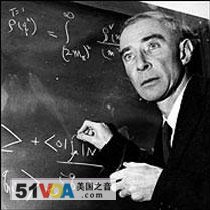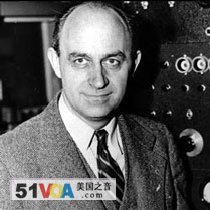Lesson 2: Oppenheimer and Fermi
听力原文
VOICE ONE: I'm Sarah Long.
VOICE TWO:And I'm Steve Ember with People in America in VOA Special English. Today we report about two scientists, J. Robert Oppenheimer and Enrico Fermi, who helped lead the world into the nuclear age.
VOICE ONE: It is July sixteenth, nineteen forty-five. All is quiet in an American desert at Alamogordo, New Mexico. Suddenly there is a terrible explosion. A huge cloud rises from the Earth. The sky turns purple and yellow.
The first atomic bomb has been exploded. It is a test of the mostly deadly weapon ever known. American officials are considering using this weapon to try to end World War Two.
J. Robert Oppenheimer J. Robert Oppenheimer J. Robert Oppenheimer is the head of the Los Alamos laboratory. It is the creative center of the secret Manhattan Project, which made the explosion possible. As the cloud rises, Mister Oppenheimer remembers words from the Hindu holy book, the Baghavad Gita. He says: "For I am become death, the destroyer of worlds. "
VOICE TWO: Less than one month after the test at Alamogordo, the United States dropped atomic bombs on two Japanese cities. President Harry Truman announced to the world about the first bomb:
PRESIDENT TRUMAN: "The world will note that the first atomic bomb was dropped on Hiroshima, a military base. We won the race of discovery against the Germans. We have used it in order to shorten the agony of war, in order to save the lives of thousands and thousands of young Americans. We shall continue to use it, until we completely destroy Japan's power to make war.
The Japanese soon surrendered. World War Two ended.
VOICE ONE: Enrico Fermi Enrico Fermi Enrico Fermi had been the first to use a neutron to produce the radioactive change of one element to another. He was a refugee from Fascist Italy. He and other refugee scientists were worried that Germany was working to develop an atomic bomb. They urged the United States government to pay for a secret scientific effort, called the Manhattan Project, to create the bomb. Mister Fermi helped Mister Oppenheimer prepare the Alamogordo bomb test.
Yet later both Mister Oppenheimer and Mister Fermi spoke against further development of nuclear weapons. Both men opposed the hydrogen bomb.
VOICE TWO: J. Robert Oppenheimer was born in New York City on April twenty-second, nineteen-oh-four. Even as a boy, he showed he had unusual intelligence. As a young man he attended Harvard University, in the eastern United States, and Cambridge University in England.
He earned his doctorate in physics at Gottingen University, Germany, in nineteen twenty-seven. There he worked with the famous scientist, Max Born. By nineteen thirty, Mister Oppenheimer was teaching at two top universities on the American West Coast. His fame as a teacher spread. Soon he was teaching the best students of physics in the United States.
VOICE ONE: In nineteen forty-two, Mister Oppenheimer joined the American government's project to develop the atomic bomb. He was appointed head of the Los Alamos Laboratory. Many of his former students worked for him on the project. One year after the bombs were dropped on Japan, he received the Presidential Medal of Merit for his work. In nineteen forty-seven, he began to direct the Institute of Advanced Studies at Princeton University on the East Coast.
VOICE TWO: At the same time, Mister Oppenheimer became chairman of the advisory committee to the United States Atomic Energy Commission. He used the position to try to make the public recognize the dangers of nuclear power as well as its possibilities for good. He regretted that work was being done to develop the hydrogen bomb. He felt it was bad for both scientific and humanitarian reasons.
However, extreme tension existed between the United States and the Soviet Union at the time. So in nineteen forty-nine President Truman decided that work on nuclear weapons should continue.
VOICE ONE: J. Robert Oppenheimer's life and work were affected deeply by Americans intense fear of Communism in the nineteen fifties. Mister Oppenheimer made an easy target for suspicious critics. His wife had once been a Communist. Some of his friends were former Communists. Years earlier he had suggested sharing nuclear secrets with the Soviets. He opposed developing the hydrogen bomb.
In nineteen fifty-four, the Atomic Energy Commission and a special security committee moved against Mister Oppenheimer. They did not question his loyalty to the United States. However, they said his personal life made him a threat to national security.
VOICE TWO: Mister Oppenheimer had directed one of America's most important secret scientific projects. Now this famous physicist was barred from secret work for the government. He published several books during this difficult period of his life. One of the best known was "The Open Mind. "The books contained his thoughts about science. He continued teaching at Princeton University. Again he taught many of the most important scientists of our century.
VOICE ONE: In time Mister Oppenheimer's work in science and teaching made people forget the accusations against him. The government decided to give him the highest award of the Atomic Energy Commission for his work on atomic energy. President Lyndon Johnson presented the honor in late nineteen sixty-three. It was called the Enrico Fermi Award. J. Robert Oppenheimer died of throat cancer on February eighteenth, nineteen sixty-seven. He was sixty-two years old.
VOICE TWO: Enrico Fermi had worked with Robert Oppenheimer and other top scientists to develop the atom bomb. He won an award for his work in atomic energy from the Atomic Energy Commission in nineteen fifty-four. It was the first time the award was presented. Later, the honor was named for him. It recognized Mister Fermi as one of the greatest physicists of the Twentieth Century.
VOICE ONE: Enrico Fermi was born in Rome, Italy, on September twenty-ninth, nineteen-oh-one. After his education in Italy, he studied with Max Born in Germany, just as Robert Oppenheimer had.
Enrico Fermi returned to Italy in nineteen twenty-four. He became that nation's first professor of theory of physics. At the time there was almost no physics education offered in Italy He married Laura Capon, who also was a scientist, in nineteen twenty-eight.
Laura was Jewish. Later the Fermis decided to leave Italy, because the Fascist government had begun oppressing Jews.
VOICE TWO: Enrico Fermi went to Stockholm, Sweden, to accept a Nobel Prize in nineteen thirty-eight. He won for producing new radioactive elements beyond uranium. Without knowing it, he had split the atom.
However, that fact was not recognized until later. He and his family sailed directly from Stockholm to the United States. If he stayed in Europe, he might have been forced to work for Nazi Germany.
VOICE ONE: Mister Fermi taught at Columbia University in New York City. He also was part of the American research team for the top secret Manhattan Project Mister Fermi led the team that created the world's first controlled, continued nuclear-fission reaction. It happened on December second, nineteen-forty-two, at the University of Chicago.
VOICE TWO: Mister Fermi directed the building of the first atomic reactor that made the reaction possible. He had invented the method with another scientist, Leo Szilard. The reactor was put together in a squash court under the seats of the university sports center. It contained natural uranium placed in graphite and controlled by pieces of cadmium and boron rods.
By nineteen forty-four, Enrico Fermi had become a citizen of the United States. He was asked to help Robert Oppenheimer with the atomic bomb test at Alamogordo.
Mister Fermi returned to the University of Chicago after the war. There he headed the Institute for Nuclear Studies, now known as the Enrico Fermi Institute.
VOICE ONE: Like Mister Oppenheimer, Mister Fermi recognized the dangers of atomic energy. They both worried about the possible use of a hydrogen bomb.
With another scientist, Mister Fermi wrote a nineteen forty-seven report to the Atomic Energy Commission. The report opposed creation of the bomb for humane reasons. Enrico Fermi died of cancer in Chicago in nineteen fifty-four. He was fifty-three years old.
VOICE TWO: J. Robert Oppenheimer and Enrico Fermi were two of the greatest scientists of the century. They were both concerned about the results of their discoveries that led the world into the Nuclear Age.
(MUSIC)
VOICE ONE: This Special English program was written by Jerilyn Watson. It was produced by Paul Thompson. I'm Sarah Long.
VOICE TWO: And I'm Steve Ember. Join us again next week for People in America in VOA Special English.
听力背景
奥本海默(J. Robert Oppenheimer)1904年出生在纽约一个富裕家庭。由于家道中落,法西斯主义的崛起,到他成为伯克莱加州大学物理学教授的时候,已经是一个政治观念左倾激进的人了。
1942年,奥本海默入选一个物理学家团体,评估制造原子弹的可能性。主持美国政府这个“曼哈顿计划”的戈罗夫斯将军(Gen. Leslie R. Groves)深为奥本海默的思想和才华所吸引,他不顾监督“曼哈顿计划”的一些安全官员的反对,将奥本海默任命为洛斯·阿拉莫斯实验室(the Los Alamos Scientific Laboratory)的主任。
这个新的实验机构在1943年4月成立的时候只有几百名科学家,但是迅即发展成一个拥有六千名男女专家的“秘密之城”。二十七个月以后,这些专家在他们昵称为“奥匹”的奥本海默领导下,成功地制造出世界上第一个原子弹。 洛斯·阿拉莫斯的人们一致认为,没有奥本海默的非凡领导才能,原子弹赶在战争结束之前实验成功,并且投入使用,是不可能的。对于成为美国原子弹之父的奥本海默来说,这是一种骄傲,更是一个沉重的负担。
位于美国新墨西哥州旷野中的“秘密之城”洛斯·阿拉莫斯范围很大,星散着许多低矮的办公室、实验室。奥本海默不是驾驶一辆军用吉普,就是开着他自己的那辆大型黑色别克,在这些办公室、实验室之间出没。每到一处,他总是坐在房间的最后面,不停地抽烟,静静地聆听大家的讨论。他的出现常常可以激活人们的更高想像能力。
Enrico Fermi是物理学家,对统计物理、原子物理、原子核物理、粒子物理、中子物理都有重要贡献。在他领导下建成了世界上第一座可控原子核裂变链式反应堆,为原子能的利用做出了开创性的工作。
1901年9月29日出生于罗马。1918年进人比萨大学,1922年获得博士学位。继而去德国格丁根大学随M·玻恩工作,后又去荷兰莱顿大学随 P·厄任费斯脱工作。1924年回到意大利,在罗马大学任教,1925年到佛罗伦萨大学任讲师。1927年回罗马在帕尼斯佩纳大道的物理研究所工作,并在罗马大学担任第一任理论物理讲座。
1926年初,他根据泡利不相容原理,提出电子应服从的统计规律——费密-狄喇克统计。1927年冬,他根据费密-狄喇克统计原理建立了一个原子结构的模型理论——托马斯-费密模型。
1933年,费密提出了B衰变理论,成功地解释了B衰变现象的许多特点。由于中子核反应的发现,他获得1938年诺贝尔物理学奖。
1938年意大利颁布了法西斯的种族歧视法,由于费密的妻子是犹太血统,他于1938年11月利用去瑞典接受诺贝尔奖的机会,携带家眷离开意大利去美国,先在纽约哥伦比亚大学,后在芝加哥大学任教。
1939年N·玻尔去美国时告诉他钠裂变的消息后,费密就着手探索核裂变链式反应的可能性。在他领导下,他和助手们在1942年12月2日在芝加哥大学建成世界上第一座可控原子核裂变链式反应堆,使它达到临界状态,产生可控的核裂变链式反应。这一成就是原子能时代的一个重要里程碑。随后费密参加了原子弹的研制工作。
为了反对把原子能用于战争目的,费密于1946年初离职回到芝加哥大学任教,转入粒子物理这个新领域的研究。一批有为的青年慕名来到芝加哥大学,聚集在他的左右,其中如杨振宁、李政道、M·盖耳—曼和O·张伯伦等人,后来成为有重要贡献的物理学家。芝加哥大学的同步回旋加速器建成以后,费密和他的小组于1951年发现了第一个核子共振态。1954年11月29日费密病逝于芝加哥。
难点词句
1.deadly a.致命的, 致死的 例句:Report cites deadly medical errors. 报告引述致命的医疗差错。 2.surrender v.交出, 放弃, 使投降, 让与 例句:The enemy surrounded the town trying to force them to surrender. 敌人围困了这个城,想逼他们投降。
3.oppose v.反对, 以...对抗, 抗争例句:Those who oppose the people will come to no good end. 与人民为敌的人绝不会有好下场。
4.appoint vt.任命, 指定, 下令 例句:Do they appoint him secretary? 他们任命他为秘书了吗?
5.intense a.非常的, 强烈的, 紧张的, 热情的 例句:We needed to rest from the intense heat of the desert. 我们得休息一下,避开沙漠的酷热。
6.suspicious a.可疑的, 多疑的, 怀疑的 例句:Tim looks suspicious. I doubt he is purposing a robbery. 蒂姆看起来很可疑,我怀疑他在策划抢劫。
7.oppress vt.压迫, 压抑, 使烦恼 例句:You mustn't use force to bully and oppress the weak. 你不要用强力欺压弱者。
1.We have used it in order to shorten the agony of war, in order to save the lives of thousands and thousands of young Americans. in order to为了 He was even prepared to die in order to defend the honor of his family. 他誓死捍卫家族的荣誉。
2.Mister Fermi directed the building of the first atomic reactor that made the reaction possible. make是使役动词,后面可以跟宾语补足语。用来说明宾语的行为、特征、状态、身份等。最常见的使役动词有:make, have, leave。
3.It contained natural uranium placed in graphite and controlled by pieces of cadmium and boron rods. placed in graphite and controlled by 是过去分词做后置定语,修饰uranium。
下载地址
点击下载附件列表
词条内容仅供参考,如果您需要解决具体问题
(尤其在法律、医学等领域),建议您咨询相关领域专业人士。
如果您认为本词条还有待完善,请 编辑
上一篇 Lesson 1: Aaron Copland 下一篇 Lesson 3: Favorite Song About Summer


